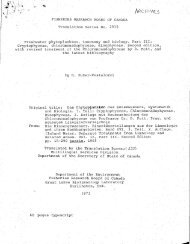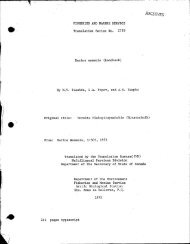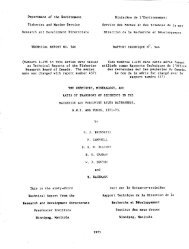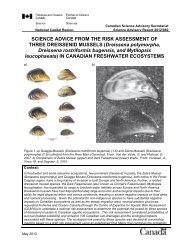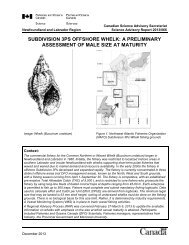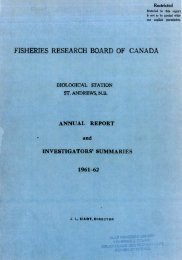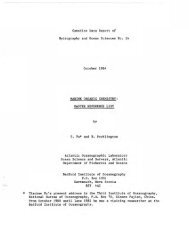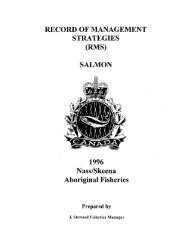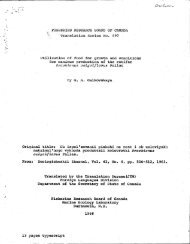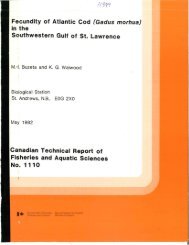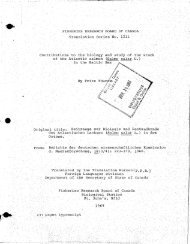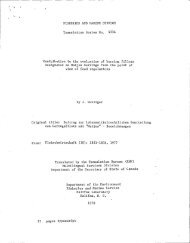Create successful ePaper yourself
Turn your PDF publications into a flip-book with our unique Google optimized e-Paper software.
34<br />
nine years was 101,805 barrels, and for the latter 96,067 barrels, a difference of but 5,738<br />
barrels per annum. The average catch of mackerel in all Canada, during the nine<br />
teen years from 1869 to 1887, was 146,271 barrels per annum, and for the ten years<br />
from 1869 to 1878, the annual catch was 139,340 barrels, while for the nine years<br />
from 1879 to 1887, the catch was 153,202 barrels, or an increase of 13,862 barrels<br />
per annum over t he former period, and an increase of 6,931 barrels over the general<br />
average for the whole period, which certainly gives no evidence that mackerel are<br />
becoming scarce on our coasts. I think it quite probable that we shall have a large<br />
yield from this branch of the fisheries in the immediate future. It is quite common<br />
for this, as well as other branches of the fisheries to fail for several years in succeseion,<br />
and then return again more abundant than ever. The Manhaden fishery<br />
along the American coasts, fell off almost to nothing nine years ago, and continued<br />
in that state, until the present year, when they returned more plentiful than for<br />
thirty years past. During their absence, all kinds of theories were advanced, by<br />
fishermen and others, but in particular, the modes of fishing were thought to be, as<br />
usual, the cause of the destruction, while really there was no destruction, but the<br />
fish were controlled in their movements by natural causes. For fifty years previous<br />
to 1864, the complaint was periodically raised and pressed upon the law makers of<br />
Great Britain, that beam trawling and other modes of fihing were ruining the<br />
coast and deep sea fisheries, and demands were made for prohibitory laws. The<br />
government, however, appointed and sent out a Royal Commission to enquire into<br />
the whole question of the effect of the modes of fishing upon the fish supply, and<br />
after a thorough enquiry all around the coasts, the commission had no hesitation in<br />
reporting that so far from there being any decrease in the natural supply, there was<br />
an increase, and recommended that all laws restricting the catch of coast ani deep<br />
sea fish be repealed. Accordingly such laws were removed from the Statute-book,<br />
except such as were needed to keep peace among the fishermen, by protecting mdi.<br />
vidual rights. So that if in the Old World after many centuries of fishing big countries<br />
containing many millions oC population, the supply of fish was not wanting, I do<br />
iiot think we need trouble ourselves on this point, as a new country, with our<br />
fishery resources scarcely yet developed.<br />
The late 1'rofessor Baird, and Professor J. Browne Goode of the United States,<br />
after much investigation, fully agree with Professors Sarrs of Sweden, Alman of Norway,<br />
and 11uley of Great Britain, that the few fish taken for human food, contributes<br />
almost nothing to the decline of sea or coast fish. On this subject Professor<br />
goode's views will be found in the Encyclopedia Britannica, Article Pisoiculture.<br />
HERRINGS<br />
Were quite plenty on most of the coast, and a fair average crop has been gathered,<br />
while the prices obtained have been fair. The total catch was 175,285 barrels, as<br />
against 181,146 barrels last year, a decrease of but 5,861 barrels. There are many<br />
influences both natural and commercial, as well as the scarcity or abundance of fish<br />
on the coast, which affect the quantity caught from year to year, consequently the<br />
average result of a group of years is the best criterion from which to judge of a permanent<br />
decrease or otherwise, in any branch of the fisheries.<br />
There was a short catch of Digby herring this year, the total quantity being<br />
33,000 boxes as compared with 85, 10 boxes last year. The cause for the decline<br />
is difficult to determine, but we may be sure the cause is not local, the same thing<br />
having repeatedly occurred before.<br />
ALEWIVES.<br />
There was a shortage in the catch of alewives during the past year, of 1,500<br />
barrels, caused mainly by the high water and the state of the streams throughout the<br />
'fishing season. The supply of these fish is steadily increasing, as the result of<br />
better protection and improved flshways.



